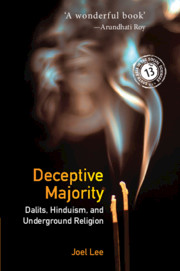3 - Missionary Majoritarianism: The Arya Samaj and the Struggle with Disgust
Published online by Cambridge University Press: 15 February 2021
Summary
c. 1928
Arya Samaj tract addressing the sanitation labor castes: “In the census you were returned as Hindu. You people are Hindu, your religion is Hindu, the Veda is your holy book, Balmiki ji is your guru. So those of you who circumcise, who marry and bury by Muslim rites, are perpetrating a great sin.” (S. Sharma n.d.: 23)
1933
Gandhi, discussing temple-entry legislation with Ambedkar: “But I must say that you ought not to say that you are not a Hindu. In accepting the Poona Pact you accept the position that you are Hindus.”
Ambedkar: “I have accepted only the political aspect of it.”
Gandhi: “You cannot escape the situation that you are Hindus in spite of your statement to the contrary.” (Ranga 2000: 131)
1950
Government of Independent India: “[N]o person who professes a religion different from the Hindu religion shall be deemed to be a member of a Scheduled Caste.” The Constitution (Scheduled Castes) Order, 1950
From Alterity to Identity
In the previous chapter we saw that the nineteenth century British innovation of categorizing the “untouchables” as Hindus contradicted prevailing perceptions of those so categorized. Hindu census enumerators objected to recording untouchables as co-religionists, Lal Begis spoke of themselves as a religious community (qaum) separate from and oppressed by the Hindus, and colonial administrators charged with implementing the new policy described it as “absurd.” How is it, then, that the central premise of the new policy attained, by the latter half of the twentieth century, hegemonic status? When neither untouchables nor Hindus perceived each other as co-religionists in 1900, how did it come to pass that virtually everyone presumes them to be members of the same religious community a hundred years later? As we have seen, scholars over the decades continue to be startled when they discover that Dalits whom they meet in remote corners of north India—Dalits who are neither converts to Islam or Christianity nor committed to a repudiation of Hinduism following Ambedkar's example—speak unselfconsciously of Hindus as others. But when did this become a matter of surprise? How did a notion that apparently remains foreign to some of the very people about whom it speaks become a foundational assumption for everyone else?
- Type
- Chapter
- Information
- Deceptive MajorityDalits, Hinduism, and Underground Religion, pp. 77 - 120Publisher: Cambridge University PressPrint publication year: 2021



